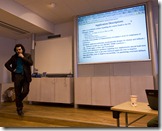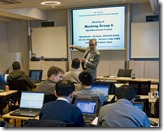SC34 Meetings, Stockholm
The SC34 plenary and working-group meetings took place in Stockholm last week, hosted by Swedish Standards Institute (SIS). Alex Brown has posted already a summary of some of the meetings that I didn’t participate in, and I’ll cover the here the activities and outcomes of the meetings I attended.
WG4: ISO/IEC 29500 (Office Open XML)
WG4 met all day Tuesday and Wednesday, with a brief closing session on Thursday morning. We had 30 participants representing 12 national bodies (Brazil, Canada, China, Czech Republic, Denmark, Germany, Finland, France, United Kingdom, Korea, Norway and the United States) and 3 liaison organizations (Ecma, W3C, and XML Guild).
The bulk of WG4’s time was devoted to processing defect reports. Going into the meeting, we had 133 defect reports outstanding, including 82 technical, 11 editorial, and 40 requests for information. During the meetings last week we processed 61 of these. That leaves 72 outstanding, and WG4 will continue work on those via the teleconferences that will resume on April 8.
Here’s a summary of WG4’s processing of defect reports in Stockholm, grouped by the date ranges when defect reports had been submitted:
Separate from the processing of specific defect reports, WG4 also discussed some general topics relation to Open XML maintenance:
- WG4 convenor Murata Makoto covered the basic concepts behind kihon-hanmen, a grid-based approach that is used in CJK (China/Japan/Korea) page layout. Japan has submitted a proposal to add this concept to IS29500.
- Gareth Horton (UK/Datawatch) and Chris Rae (Ecma/Microsoft) have been collaborating on defining a profile for the use of 8601 in ISO/IEC 29500, and Gareth provided WG4 with an overview of that work. This led to an agreement to request creation of a new amendment (covered below under the plenary).
- We discussed at some length Japan’s proposal for adding the Office 2010 extensions, which are implemented through the extension mechanisms described in the standard, into IS29500 itself. Some national bodies are in favor of this concept, some are opposed, and others would like to consider the extensions individually to determine which are appropriate for standardization. Discussion will continue on this topic, including the question of whether such extensions should be incorporated into a new Part 5, or each extension should stand on its own as a separate Part.
WG6: ISO/IEC 26300 (OpenDocument Format)
WG6’s work was mostly focused on the errata for ODF 1.0 and the creation of an amendment to ISO/IEC 26300 in response to OASIS’s submission of ODF 1.1 to JTC1. There was a full room for the meeting, with over 30 attendees including several participating by telephone.
As Alex mentioned on his blog post, Dennis Hamilton provided a great deal of support via his phone participation on the messy issues of text production. One nice touch was that Dennis had made available a marked-up copy of ODF 1.0 that showed the errata items inline, to make it easier for WG6 members to review those changes in their proper context.
SC34 Plenary
The plenary meeting itself was fast-paced and businesslike, with the main order of business being the approval of various resolutions (as listed here). Resolutions 10, 11 and 12 may be of particular interest to readers of this blog:
- Resolution 10 created a new amendment for Part 4 of IS29500, which will be used to create a ballot for removal of ISO 8601 dates from the Transitional conformance class. Although 8601 dates were added at the BRM, some WG4 members have expressed concern about the possible interoperability problems that could arise for ECMA-376 and IS29500 Transitional implementations that don’t understand 8601 syntax.
- Resolution 11 announced a workshop that will be held in Seoul in May to cover “CJK Issues related to OOXML and ODF Extensions.” A report from this workshop will be presented to both WG4 and WG6, with the goal of enabling a coordinated approach to CJK issues across both standards.
- Resolution 12 created a “project subdivision” the amendment to ISO/IEC 26300 that will bring it into alignment with OASIS ODF 1.1.
Finally, Ken Holman, the former SC34 Secretary and longtime SC34 participant from Canada, announced his retirement from standards work, and he will be replaced by Paul Cotton as chair of the Canadian SC34 mirror. Ken said that he plans to crash future SC34 parties, though, so we’ll still be seeing him from time to time.
It was a busy week, but we got a lot done to move things forward in both Open XML and ODF maintenance. Next stop for the SC34 meetings will be Helsinki in June.
Comments
Anonymous
April 02, 2010
Great to know. Say, when will Microsoft support ISO/IEC 29500? It looks like Office 2010 still supports only OOXML Transitional, which was rejected by ISO for producing new documents, so how can I produce new ISO-standard files with MS Office? Should I use OpenDocument for that? But then, how may I produce documents with ODF, if MS Office won't support editing features such as revisions, etc. in ODF? As a matter of fact, it's a bit strange that I can track editions on legacy documents, but not on new ones... And other stuff like that. I know we discussed that before. Still, you have to admit it seems a bit strange; doesn't Microsoft care about standards? I mean, reading Ken Brown's blog, I found this: http://www.adjb.net/post/Microsoft-Fails-the-Standards-Test.aspx And if even an MS supporter can get tired of MS' attitude, who won't?Anonymous
April 05, 2010
The comment has been removedAnonymous
April 05, 2010
Good point, Ian. FYI, I was looking at the minutes of the meeting when I made that comment, where Mohamed Zergaoui is listed as the W3C liaison.Anonymous
April 10, 2010
Can you explain to me why there are some binary format when you just create a document with only text "Hello World" ? Is the format is supposedly open there should be no metainfo in binary format. I'm really angry at that, seems like fake "openess" to me.



